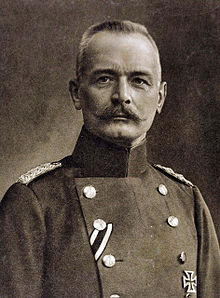Erich von Falkenhayn
| Erich von Falkenhayn | |
|---|---|
 |
|
| Prussian Minister of War | |
|
In office 7 June 1913 – 21 January 1915 |
|
| Monarch | Wilhelm II |
| Prime Minister | Theobald von Bethmann-Hollweg |
| Preceded by | Josias von Heeringen |
| Succeeded by | Adolf Wild von Hohenborn |
| Chief of the German General Staff | |
|
In office 14 September 1914 – 29 August 1916 |
|
| Monarch | Wilhelm II |
| Chancellor | Theobald von Bethmann-Hollweg |
| Preceded by | Helmuth von Moltke the Younger |
| Succeeded by | Paul von Hindenburg |
| Personal details | |
| Born | 11 September 1861 Burg Belchau, Prussia, Kingdom of Prussia |
| Died | 8 April 1922 (aged 60) Potsdam, Brandenburg, Weimar Germany |
| Spouse(s) | Ida Selkmann |
| Relations |
Eugen von Falkenhayn (brother) Fedor von Bock (nephew) Henning von Tresckow (son-in-law) |
| Children | Fritz Georg Adalbert von Falkenhayn (born 1890) Erika Karola Olga von Falkenhayn (born 1904) |
| Profession | military officer |
| Awards |
Order of the Black Eagle Pour le Merite with Oak Leaves |
| Military service | |
| Allegiance |
|
| Service/branch |
German Army Ottoman Army |
| Years of service | 1880–1922 1917–18 (Ottoman Army) |
| Rank |
General of the Infantry (German Army) Field Marshal (Ottoman Army) |
| Commands |
4th Foot Guards (German Empire) Chief of the German General Staff 9th Army (German Empire) Army Group F (Ottoman Army) 10th Army (German Empire) |
| Battles/wars |
Boxer Rebellion First World War |
General Erich Georg Anton von Falkenhayn (11 September 1861 – 8 April 1922) was the Chief of the German General Staff during the First World War from September 1914 until 29 August 1916. He was removed in the late summer of 1916 after the failure at the battle of Verdun, the opening of the Allied offensive on the Somme, the Brusilov Offensive and the entry of Romania into the war. He was later given important field commands in Romania and Syria. His reputation as a war leader was attacked in Germany during and after the war, especially by the faction which supported Hindenburg. Falkenhayn held that Germany could not win the war by a decisive battle but would have to reach a compromise peace; his enemies said he lacked the resolve necessary to win a decisive victory. Falkenhayn's relations with the Chancellor Bethmann-Hollweg were troubled and undercut Falkenhayn's plans.
Falkenhayn was born in Burg Belchau near Graudenz, West Prussia (now Białochowo, Poland) to Fedor von Falkenhayn (1814–1896) and Franziska von Falkenhayn, née von Rosenberg (1826–1888). His brother Arthur (1857–1929) became tutor of Crown Prince Wilhelm while Eugen (1853–1934) became a Prussian General of Cavalry. His only sister Olga von Falkenhayn was the mother of Fieldmarshall Fedor von Bock.
Becoming a cadet at the age of 11, he joined the Army in 1880. He served as an infantry and staff officer and became a career soldier.
Between 1896 and 1903, Falkenhayn served in Qing China on leave for several years and saw action during the Boxer Rebellion. He also spent time in Manchuria and Korea.
...
Wikipedia
